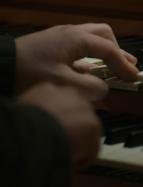Spiegel im Spiegel [Mirror in the Mirror]
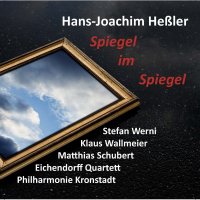 Hans-Joachim Hessler:
Hans-Joachim Hessler:
Mirror in the Mirror
A programmatic improvisation on four stories from the cycle of the same title by Michael Ende.
"...the quintessence of my producing sofar..."
(Hans-Joachim Hessler)
...with the terrific Matthias Schubert at the tenor saxophone...
»Hessler & Schubert reaped enthusiasm«
(Rheinische Post dated July 07,2009)
...with jazzband, church organ, string quartet and orchestra...
...after the correspondent Labyrinth of the master-narrator Michael Ende
(http://en.wikipedia.org/wiki/The_mirror_in_the_mirror)
"Hardly anyone knows that Michael Ende, the terrific creator of the Neverending Story,
also wrote texts for adults - for example his prose volume The Mirror in the Mirror, a series of absurd
and surreal reflections that turn our usual perceptions upside down. The idea of mirroring also fascinated
the composer and pianist Joachim Hessler - after all, mirrorings, reversings and canons have been well-known
musical techniques ever since the middle ages. Hessler mirrors four narrations of Ende's work with musical
refinement and connects coposed and free passages so elaborately that the Berlin tenor Matthias Schubert,
who considering his amazing scope belongs to the strongest saxophone players of Germany, can play out his
entire emotionality. A dazzling reflex which, illuminated by Ende, surpasses usual expectations«
(Traumzeit, July 6, 2009)
The "participants combined composed and free passages in such a way that they created a dream-like world of
sound..." (Coolibri 4/2012, p. 28).
"So when a musician undertakes a programmatic improvisation from the cycle [Mirror in the Mirror by Michael
Ende], the circle of painting, literature and music is complete. [...] As frontier runner between
contemporary composition and free improvisation, Hessler dedicates himself to his concept of »conceptual
discontinuity« with creative plenty, musical finesse, high emotional denseness and partly almost unsettling
intensity - thereby creating an own labyrinth of mirroring, surreal, poetic, filled with warm light"
(Tobias Boecker in Jazzpodium 7-8/2012, p. 84)
"The main thing is that it is good. And it is good. Ende's text »Heavy black cloth« (track 2) deals with
a dancer who waits for his performance which will never take place. This dance, as it is written in Ende's
text, is supposed to begin »with a mighty drumbeat«. In the text, which artistically marks time, the
releasing drumbeat never occurs. The music, however, delivers it after exactly 6:29 minutes, and then the
dance begins: wild, frolic. In another text of Ende, the music delineates the traces, which an ice-skater,
in a sophisticated way, draws in the sky with his ice-skates (track 4). Here, the beautiful transitions
surprise: in the middle of this piece of music, there is a passage which at first sounds like a popular
catchy tune from a fully air- conditioned hotel lobby in Las Vegas. However, the way in which the tenor
saxophone (Matthias Schubert) then frees itself from the dialogue with the piano (Hessler) and celebrates
odd obstinacy in a most profuse way - that is classy" (Jens Sparschuh, newspaper DER TAGESSPIEGEL Nr. 21399,
dated July 22, 2012, p. 28).
"Ideologies, in relation to a «contemporary» language of sound, are unknown to the composer Hans Joachim
Hessler. His competence in style allows him to engage with alternations between free-tonal and a-tonal music,
between composed and improvised passages, between quote and original. The composer documents this again
clearly in his four programmatic improvisations «mirror in the mirror». It becomes clear in the programmatic
improvisations on Michael Ende's texts that irony and satire are well-known to Hessler. A precursor to
Hessler's surreal streak can be seen in the string quartet «Dance in the bird cage», which with its sounds
of flamenco shows folkloristic allusions. The orchestra piece «Nabuli Tintin» of 1999 tells a lot about
Hessler's constantly searching and wide-ranging spirit as a composer. As a homage to Arvo Pärt, whose
Tintinnabuli-style (Glockenspiel-style) led, in the 1970s, out of modernity, which he felt had no future,
«Nabuli Tintin» demonstrates the multifaceted possibilities of «postmodern» composition" (Dr. Barbara
Dobrestsberger in Glarean Magazin, dated July 6, 2012).
JAZZ BAND
Matthias Schubert - tenor saxophone
Hans-Joachim Hessler - organ, piano, keyboards
Stefan Werni - double bass, electronic
Klaus Wallmeier - drums, voice
ORCHESTRA
National Philharmonic Orchestra Brasov, Rumania
Director: Ovidiu Dan Chirila
EICHENDORFF-QUARTETT
Michael Nachbar - violin
Ogtay Zeynalou - violin
Benjamin Nachbar - viola
Ludmila Pefritschenko - violoncello
NonEM-Records AAM9414
More Than 777 Years
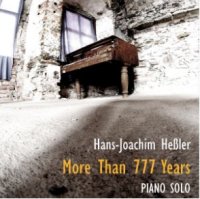 Hans-Joachim Heßler:
Hans-Joachim Heßler:
More Than 777 Years
A stroll through
the history of music
"Hans-Joachim Heßler arouses
archaic allegros on his keys."
(WAZ)
"Anyone looking for a connection
to the history of music and religion in Hessler's new recording will find it. [...] Piano music to be enjoyed."
(Dresdner Universitätsjournal)
"The listener has manifold chances to gain a new understanding of music. It has also become clear here that the
act of overcoming borders doesn't need to result in a sound muss."
(Neue Westfälische).
"Hans-Joachim Hesslers piano solo taught listeners
how intensely music can be experienced in a physical way.
During the solo the pianist seemed to completely become one with his instrument."
(Ruhr-Nachrichten)
"Hans-Joachim Heßler captivated
[his audience] with an energetic presentation and theatrical drama."
(Westfälisches Volksblatt)
"The extraordinary artist presented a
highly exciting musical evening
and fully convinced the audience."
(Westfälischer Anzeiger)
"...[various] influences can be found in a unique, very personal and intensely felt fusion[...],
transcending space and time with the capacity of musical integration."
(Jazzpodium)
"There is no blurring, no flattering, no courting the audience. Rather, this directness conveys a deep seriousness of the musical matter,
as if the man at the piano simply wanted to tell us something true."
(Dr. Barbara Dobretsberger, lecturer in musicology at the University Mozarteum Salzburg).
SOUND SAMPLES
Sample 1: Danse de la Renaissance (Beginning)
Sample 2: Balet Bartok (End)
Sample 3: Improvisation sur une sonate de Domenico Scarlatti (excerpt)
Sample 4: Danse turque (End)
NonEM-Records AAM9416
Der Tanz auf dem Vulkan [Dance on the vulcano]
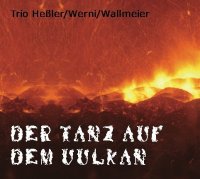 Hans-Joachim Hessler:
Hans-Joachim Hessler:
Dance on the vulcano
Recording of the concert on November 11, 2006 at the Paulus Church in the north of Dortmund
Hans-Joachim Hessler - organ, piano
Stefan Werni - double bass, Virus-synthesizer
Klaus Wallmeier - drums, percussion, voice
NonEM-Records AAM9407
Image: D. Paley, under the Creative Commons
Attribution-ShareAlike Licence
in the version 2.0
Modus Toni - Tonus Modi
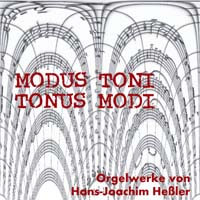 Organ works by Hans-Joachim Hessler (Nabuli Tintin, Evocation Nr.2, Weil seine Bewohner Böses tun...[Because its inhabitants comit evil],
Organ works by Hans-Joachim Hessler (Nabuli Tintin, Evocation Nr.2, Weil seine Bewohner Böses tun...[Because its inhabitants comit evil],
G.F. H.A.E.)
recorded on December
12-14, 2006 in the catholic church Herz Jesu [Heart of Jesus], Bottrop
Hans-Joachim Hessler, Thomas Klein, Ulrich Prenger and Felix Schoppmeier - organ
NonEM-Records, AAM9405
Sound example 2: G.F.H.A.E. (extract)
Sound example 3: Morgenstern-Meditation [Morning star meditation](ending)
D.A.
 Microelectronic and Mechanical Movements
Microelectronic and Mechanical Movements
recorded on August 7 and 8, 2007 in the catholic church Herz Jesu [Heart of Jesus], Bottrop
Hans-Joachim Hessler - Rensch organ (4 manuals, 56 registers), diverse percussion instruments
Stefan Werni - Virus Redback, Virus TI and Yamaha DX7 synthesizer, 1/4 violoncello
Christian Jendreiko - Virus Indigo synthesizer, Hohner SG 57 electric guitar
NonEM-Records AAM9406
Image: S. Jurvetson, under the Creative Commons
Attribution-ShareAlike Licence
in the version 2.0
Kaleidoskop #1
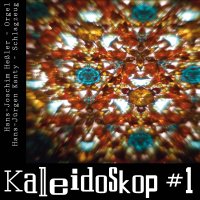 Hans-Joachim Hessler:
Hans-Joachim Hessler:
Kaleidoskop #1
Recording of the concert »Organ and drums« on October vom 2, 1999 in the Heilig-Geist-Kirche [Holy Ghost Church], Munich
Hans-Joachim Hessler, organ
Hans-Juergen Kanty, drums
NonEM-Records AAM9402
Image: H. Pellikka, under the Creative Commons
Attribution-ShareAlike Licence
in the version 2.0
Continuum contra Punctum
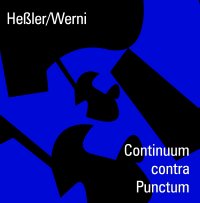 Compositions by Hans-Joachim Hessler and Stefan Werni
Compositions by Hans-Joachim Hessler and Stefan Werni
Recording of the concert on June 28, 1997 in the context of the jazz festival of the University of Dortmund
Live from the Fritz Henssler house
Katharina Herzig, violin
Stefan Werni, double bass
Michael Koball, marimbaphone
Hans-Joachim Hessler, piano
NonEM-Records, AAM9404
Bist du ein Mensch, so fühle meine Not [Are you human, then feel my distress]
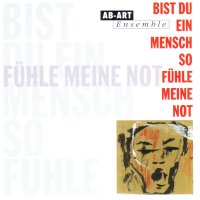 Works by Hans-Joachim Hessler (Ein leerer Traum des Glücks [An empty dream of happiness], S.L.Y., Claude und der ungerade Takt [Claude and the uneven beat], Der Bilderbuchmond [The storybook-moon]) and Ulrich Blomann
Works by Hans-Joachim Hessler (Ein leerer Traum des Glücks [An empty dream of happiness], S.L.Y., Claude und der ungerade Takt [Claude and the uneven beat], Der Bilderbuchmond [The storybook-moon]) and Ulrich Blomann
1994
Ab-Art-Ensemble:
Gesine van der Grinten, mezzo-soprano
Hans-Joachim Hessler, piano
Ulrich Blomann, saxophone
NonEM-Records AAM9401
Sound example 1: Claude und der ungerade Takt [Claude and the uneven beat]
Sound example 2: S.L.Y.
Bergaufsicht [Mining authority]
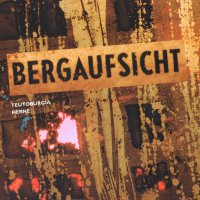 A multi-media art experience at the forest fallow and in the machine hall of the former coal-mine Teutoburgia in Herne
A multi-media art experience at the forest fallow and in the machine hall of the former coal-mine Teutoburgia in Herne
September 19-22, 1991
with Hans-Joachim Hessler, piano
Picture and sound documentation, published by the development association Teutoburgia e.V., Herne 1992
CD fn-music 910919 - out of stock
Sophisticated Jazz and Pop
Hans Joachim Hessler (Archibald Ammann):
10 Well-Tempered Appearances Of The Blues
2003
MARA-Records, AMA 626641
